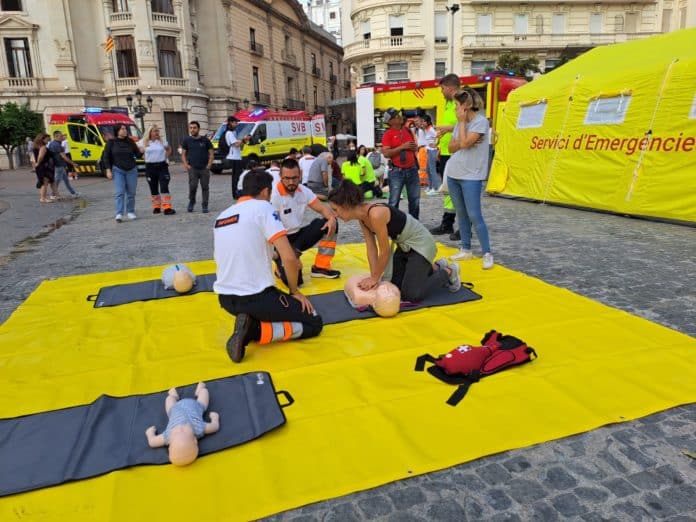SAMU medical teams based across the Valencia region have performed advanced cardiopulmonary resuscitation (CPR) manoeuvres on 1,419 patients who were in cardiopulmonary arrest so far this year.
The information was published in conjunction with an awareness campaign that took place across all three provincial capitals in commemoration of World Day against Cardiac Arrest, which is celebrated every October 16.
During the event, demonstrations on how to perform cardiac massage or basic cardiopulmonary resuscitation; the use of the AED (Automatic Defibrillator) and the Heimlich manoeuvre, to prevent choking from leading to cardiorespiratory arrest, were given to adults and children.
In addition, the children have been given specific training so that they know how to alert the emergency services, through 112, and have also been taught the importance of the chain of survival through various activities and games.
In the CICU (Emergency Information and Coordination Centre), an average of 17 calls classified as cardio-respiratory arrest are attended to each day.
It is important to note that anyone can save a life if they act quickly in the event of cardiac arrest. This initial intervention is crucial for survival, so much so that research supports that it can increase the chances of survival by more than 50%.
When someone witnesses that another person is suffering from cardiac arrest, the Ministry of Health has a telephone cardiopulmonary resuscitation protocol, through which a CICU professional gives the necessary instructions.
Therefore, the first thing to do in a situation like this is to call 112 and then the protocol is activated. From that moment on, with the help of a CICU coordinating doctor, the patient’s companion can perform the cardiac massage even if they have no prior knowledge.
The CICU gives instructions to set the pace of the compressions and remains in telephone contact with the companion until the SAMU unit arrives. Once on site, the SAMU medical team will continue with advanced cardiopulmonary resuscitation and the necessary recovery techniques to achieve stabilisation of the patient and be able to proceed with their transfer to the corresponding hospital centre.
60% of the people who have alerted 112 about a possible cardiac arrest have agreed to perform basic cardiopulmonary resuscitation assisted by a CICU professional. In the remaining 40% of cases, the manoeuvres were not started, either because it was not appropriate in those cases or because the witness who alerted already knew how to do the manoeuvres or declined to do them because he did not feel qualified.





